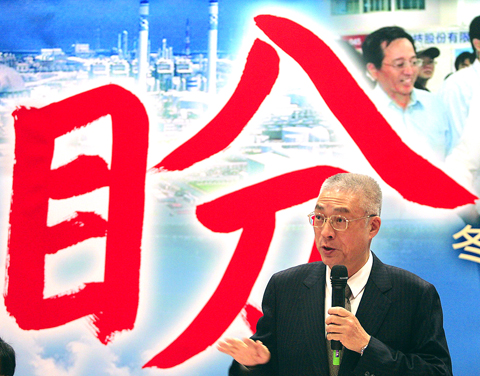Premier Wu Den-yih (吳敦義) said yesterday the government would soon lift a ban on high-tech industries setting up operations in China, saying regulations for the review and approval of applications were still being deliberated on by the Ministry of Economic Affairs (MOEA).
“I recently had a briefing from the MOEA [on reviewing investment bans on China] and was in support of its suggestions [to ease restrictions], but we still need to work out a detailed plan, as well as rules for reviewing applications,” Wu said at a press conference mapping out his Cabinet’s policies for this year.
Refusing to go into details on whether the MOEA would allow panel makers to invest in China and chipmakers to operate more advanced fabs this month as Minister of Economic Affairs Shih Yen-shiang (施顏祥) had said several weeks ago, Wu set out his position on the issue.

PHOTO: REUTERS
“The principles when handling the issue are simple. We will require that industries keep their ‘roots’ in Taiwan ... and we will allow industries to invest if they will lose their competitive edge [over foreign counterparts] should the restrictions remain,” Wu said.
Wu said the government would require industries to adopt more advanced technology locally than in their Chinese investment projects and have higher investment in Taiwan than in China.
Using the metaphor of a tree to represent his idea, Wu said: “It can’t be that the roots [in Taiwan] weigh 2kg, while the branches and leaves [in China] weigh 10kg.”
Wu said he hoped a consensus could be reached between the government and industry whereby the government allows firms to invest in China to enhance their competitiveness, while the firms would show more consideration for Taiwan.
“If we have a strong consensus on this and it is imperative [for them to expand in China], we will not keep their arms and legs tied,” Wu said.
Taiwanese companies can only invest in low-end packaging and testing facilities in China, while panel makers are prohibited from building factories.
On the government’s proposal to sign an economic cooperation framework agreement (ECFA) with China, Wu said the government still hoped the deal could be signed by May, the planned date for the next round of cross-strait negotiations.
Formal negotiations between the two sides on the ECFA are set to begin on Jan. 20.
Officials will brief members of the legislature on the progress of the talks every month, including Legislative Speaker Wang Jin-pyng (王金平), caucus whips and the chairpersons of related legislative committees, Wu said.
Regarding the controversy on the relaxation of US beef imports, Wu said the issue has taught the administration a lesson that it has to “empathize with the people” when implementing policy decisions.
The government had assessed US beef based on the scientific standards of global organizations and secured better conditions than the South Koreans in the negotiations and had “assumed” that the Taiwan-US protocol would be supported by the public, Wu said.
Wu said the element the government failed to factor in, and which resulted in the controversy, was that the agreement was “not considerate of the feelings of the public.”
“Following that lesson, the government will use plain language when talking to the public about the ECFA,” Wu said.

Taiwan is stepping up plans to create self-sufficient supply chains for combat drones and increase foreign orders from the US to counter China’s numerical superiority, a defense official said on Saturday. Commenting on condition of anonymity, the official said the nation’s armed forces are in agreement with US Admiral Samuel Paparo’s assessment that Taiwan’s military must be prepared to turn the nation’s waters into a “hellscape” for the Chinese People’s Liberation Army (PLA). Paparo, the commander of the US Indo-Pacific Command, reiterated the concept during a Congressional hearing in Washington on Wednesday. He first coined the term in a security conference last

Prosecutors today declined to say who was questioned regarding alleged forgery on petitions to recall Democratic Progressive Party (DPP) legislators, after Chinese-language media earlier reported that members of the Chinese Nationalist Party (KMT) Youth League were brought in for questioning. The Ministry of Justice Investigation Bureau confirmed that two people had been questioned, but did not disclose any further information about the ongoing investigation. KMT Youth League members Lee Hsiao-liang (李孝亮) and Liu Szu-yin (劉思吟) — who are leading the effort to recall DPP caucus chief executive Rosalia Wu (吳思瑤) and Legislator Wu Pei-yi (吳沛憶) — both posted on Facebook saying: “I

The Ministry of Economic Affairs has fined Taobao NT$1.2 million (US$36,912) for advertisements that exceed its approved business scope, requiring the Chinese e-commerce platform to make corrections in the first half of this year or its license may be revoked. Lawmakers have called for stricter enforcement of Chinese e-commerce platforms and measures to prevent China from laundering its goods through Taiwan in response to US President Donald Trump’s heavy tariffs on China. The Legislative Yuan’s Finance Committee met today to discuss policies to prevent China from dumping goods in Taiwan, inviting government agencies to report. Democratic Progressive Party Legislator Kuo Kuo-wen (郭國文) said

The Ministry of Economic Affairs has fined Taobao NT$1.2 million (US$36,900) for advertisements that exceeded its approved business scope and ordered the Chinese e-commerce platform to make corrections in the first half of this year or its license would be revoked. Lawmakers have called for stricter supervision of Chinese e-commerce platforms and more stringent measures to prevent China from laundering its goods through Taiwan as US President Donald Trump’s administration cracks down on origin laundering. The legislature’s Finance Committee yesterday met to discuss policies to prevent China from dumping goods in Taiwan, inviting government agencies to report on the matter. Democratic Progressive Party